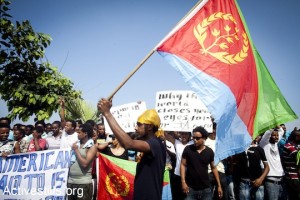
By Rufael Tecle
On June 23 the New York Times (NYT) ran an op-ed written by the Atlantic Council’s Brownyn Bruton entitled “It’s Bad in Eritrea, but Not That Bad” about recent U.N. allegations of crimes against humanity by the Eritrean government. In it, Ms. Bruton concedes that gross human rights violations have indeed occurred over the course of Isaias Afwerki’s tenure as president. In fact, it is difficult to identify what specifically she disagrees with that is contained in the report. Ms. Bruton admits that “Opposition political parties are illegal. Many dissidents have been arrested and have not been heard from since.There are few civil society organizations and no independent media.” She goes on to describe the human rights situation as “frightful” and that it is even probable that hundreds or thousands of additional cases of torture, rape or unjust imprisonment escaped the UN’s attention during the its investigation .
Despite this grim picture Ms. Bruton claims the situation is not as bad as the report claims. In addition to the progress made in the health and education sectors, her evidence for this claim seems to be the existence of some Eritreans who are able to access the internet & international news outlets, though she admits the UN was barred by Eritrea from verifying the very claims she seeks to use to discredit the report. Detectable in the article is a subtle but strenuous effort to advance the arguments employed by the Eritrean government in defending some of its actions. This is communicated in a language that is accessible to those turned off by the brash rhetoric of the regime and its supporters. Ms. Bruton argues like a good lobbyist and it is relevant for readers to know that her employer, the Atlantic Council, received between $100,000 & $249,000 in contributions from a mining company that provides the Eritrean government with its only substantial stream of hard currency, Nevsun Resources Ltd. While this fact does not in and of itself constitute a conflict of interest it is relevant information nonetheless.
There is no doubt that egregious human rights violations continue to occur in Eritrea. Many countries around the world are faced with security challenges, arguing that Ethiopia commits human rights violations at similar levels and is not censored by the international community is not a good argument against the UN’s findings. Although I do not think the country will be referred to The International Criminal Court (ICC), there must be an international mechanism to ensure human rights are observed in Eritrea. There is no other peaceful way Eritrean’s inside or outside the country can impact policy-making in Eritrea.
Ms. Bruton argues that engagement with the Eritrean government is the only way to improve conditions in the country and points to the European Union’s (EU) recent allocation of €200 million in development assistance as an example of the right approach. She however fails to mention that assistance was given in the midst of unkept commitments by the government of Eritrea to finally reform the national service program, which Ms.N Bruton admits in her piece “needs to be rethought, and the term of service reduced to a fixed and reasonable length.” The government’s backtracking on reforming the national service program highlights the importance of underwriting policy carrots with policy sticks to ensure commitments that advance human rights and development overtime are respected.
Engagement is a two-way street. The Eritrean government can & should take small steps to help pull itself out of its isolation. It can agree to receive a US ambassador to the country and, as a gesture of good will, release members of the US Embassy staff in Asmara it has held in detention since the early 2000’s. Honoring the public promises it made to not only limit the national service program but increase the pay of conscripts, even incrementally, would also signal a genuine willingness to engage. These measures could go a long way in creating the foundations for a more complicated dialogue about tackling the issues like migration, settling the border stalemate with Ethiopia and lifting the sanctions regime currently in place against Eritrea.
*Rufael Tecle is Wazema Radio contributor, University of Texas at Austin Law School graduate with an interest in Eritrea and Horn of Africa affairs. He frequently writes on redseanation.com.